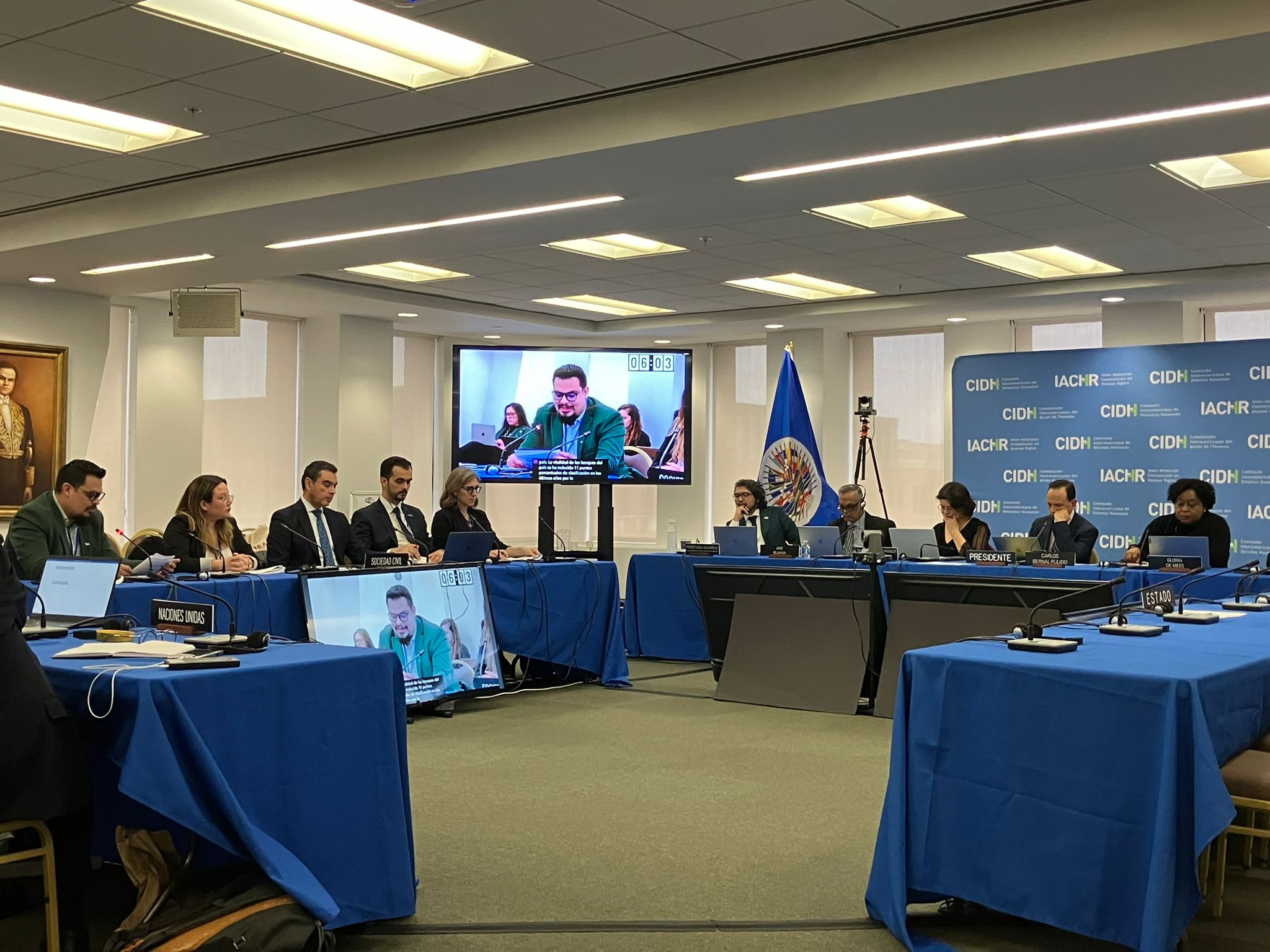At IACHR Hearing on Nicaragua: International Financial Institutions Inadvertently Fund Crimes Against Humanity
Washington, D.C., November 15, 2024 – “The international community and various funds from International Financial Institutions (IFIs) are inadvertently financing crimes against humanity,” stated Arif Bulkan, Special Rapporteur on Nicaragua […]

Washington, D.C., November 15, 2024 – “The international community and various funds from International Financial Institutions (IFIs) are inadvertently financing crimes against humanity,” stated Arif Bulkan, Special Rapporteur on Nicaragua for the Inter-American Commission on Human Rights (IACHR), during the thematic hearing titled “Nicaragua: International Financial Support and Its Impact on Human Rights,” held on Thursday, November 14.
The hearing included representatives from the Institute on Race, Equality and Human Rights (Race and Equality), the Inter-American Dialogue, Fundación del Río, and Urnas Abiertas; commissioners from the IACHR; and members of the Group of Human Rights Experts on Nicaragua (GHREN).
Christina Fetterhoff, Director of Programs at Race and Equality, opened the session by outlining Nicaragua’s ongoing democratic and human rights crisis. She highlighted the Ortega-Murillo regime’s power consolidation, the closure of civic spaces, and systematic repression of dissent. “The regime has canceled the legal registration of over 5,400 civil society organizations out of the 7,200 that existed. However, despite extensive documentation of the crisis, international development projects funded by international financing have not been reviewed, suspended, or canceled,” warned Fetterhoff.
Marcelo Azambuja, Legal Program Officer at Race and Equality, revealed that the World Bank, Inter-American Development Bank (IDB), and the Central American Bank for Economic Integration (CABEI) currently support 88 projects in Nicaragua worth $4.35 billion. Of these, fifty projects worth $2.7 billion were approved after 2018, when Nicaragua’s crisis intensified.
“None of these institutions has publicly addressed the crisis as a factor influencing the approval or monitoring of these projects,” Azambuja emphasized.
He also pointed out that international human rights law obliges IFIs to respect human rights by implementing due diligence measures to prevent adverse impacts. In Nicaragua, their failure to do so has violated freedom of expression through restricted access to public information about internationally funded development projects and policies.
Manuel Orozco, Director of Migration, Remittances, and Development at the Inter-American Dialogue, described the state capture in Nicaragua, where the Ortega-Murillo regime exploits state institutions and external debt for personal gain. Orozco highlighted that the regime’s authoritarian economy relies on fiscal revenue appropriation and extortion of the private sector.
He noted that Nicaragua’s reliance on external financing increased from 46% to 56% of GDP between 2017 and 2023, with public debt reaching nearly $9 billion.
Olga Valle, Director of Urnas Abiertas, emphasized that the authoritarian economic model and lack of public fund oversight have transformed the state into a vehicle for elite enrichment rather than public service. She urged IFIs to improve transparency mechanisms and adopt measures ensuring resources benefit Nicaraguans instead of the ruling elite.
Amaru Ruiz, Director of Fundación del Río, raised concerns about “green financing” directed to the Ortega-Murillo regime. Nicaragua currently manages 27 environmental projects worth $384.8 million, 66% of which are donations. Ruiz highlighted negative environmental impacts, including deforestation, greenhouse gas emissions, and biodiversity loss. He also called for greater oversight and monitoring of green financing projects to ensure transparency and respect for Indigenous and Afro-descendant rights.
Jan-Michael Simon, President of GHREN, noted the government’s systematic cancellation of 80% of nonprofit organizations’ legal status under the pretext of anti-terrorism measures. This reflects the regime’s inverted rule of law, he argued.
The hearing concluded with calls from Pedro Vaca, IACHR Special Rapporteur for Freedom of Expression, for a thorough examination of how financial resources enable repression in Nicaragua.
The participating organizations recommended that the IACHR:
- Issue a resolution on the scope of human rights obligations concerning international financial support.
- Establish a working group between the IACHR, IFIs, and civil society organizations to address sustainable development and human rights in Nicaragua.
- Publicly highlight the risks of adverse impacts from IFI-funded projects in Nicaragua.

